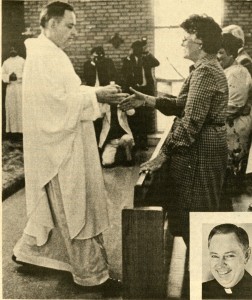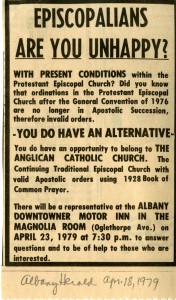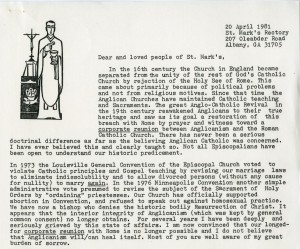
This week’s post is guest authored by Marielle Gage, a CUA graduate student in History.
On Wednesday, 30 June 1982, Mary Alma Parker went to Mass. I do not know what the sermon was about, or what songs were sung, but I know she was there because a local newspaper reporter was there, and took her picture receiving communion from the officiating priest. This small, everyday event was hardly newsworthy, save that the celebrant was Reverend James Parker, her husband. He was the first married former Episcopalian clergyman in the United States to be ordained a Catholic priest. Under a program known as the Pastoral Provision, Rev. Parker had been accepted into the Church first as a convert and then as a consecrated priest. He remained deeply involved with the Provision, as well as the various conservative Episcopalian organizations he had associated with before his conversion, until his retirement in 2005. His papers, donated to ACUA by his wife, are a veritable treasure trove of information on the Pastoral Provision and the related Continuing Anglican movement.

The 1970’s had been a decade of crisis for the Episcopalian Church. Everything, it seemed to some, changed: the decade saw revision of the Book of Common Prayer, the easing of remarriage rules for the divorced, the ordination of women, and more. These issues’ passage into Episcopalian practice was met with consternation in more conservative circles. Some grit their teeth and bore it, some formed splinter groups that either petered out or limped on into the present day, but some took a more radical step: they returned to Rome. But these new converts specifically, the converting Episcopal churchmen presented a challenge to the Catholic Church. These men, who had been priests under their old religion, wished to continue their ministry under the new. But many of these men were married, as had been permitted in the Protestant sect, but emphatically was not in the Catholic. Could these men be somehow squeezed into the Church structure? The answer, tentatively, was yes. And thus the Pastoral Provision was born.

Parker was heavily involved in the “Anglican Crisis” of the 70’s. As provincial of the Society of the Holy Cross an organization of Anglo Catholic priests Parker watched the radical departures from old practices with alarm: our collection reflects in particular his concerns surrounding women’s ordination. One particularly interesting item we received from Mary Alma is a journal he kept recording reactions he encountered on the topic. He also was an eyewitness to the 1977 St. Louis Congress, where the issue came to a head. Soon after, splinter groups began to separate themselves from the mainstream Episcopal Church, or look to join alternative Christian traditions. The Society of the Holy Cross elected Parker to represent their cause to the Catholic Church. While not everyone involved in the Society converted, Parker did, being ordained a Catholic priest on 29 June 1982. He continued to be involved in both the Continuing Anglican Movement he had left behind and the Pastoral Provision, serving for a long time as the secretary of Bernard Law (bishop of Springfield-Cape Girardeau at the time of Parker’s ordination), who had been appointed to oversee the Provision. His collection, which we have just finished processing, is an intriguing account of the ebbs and flows of ecumenical politics, the challenges of modernity, and the spiritual life of one remarkable priest.
